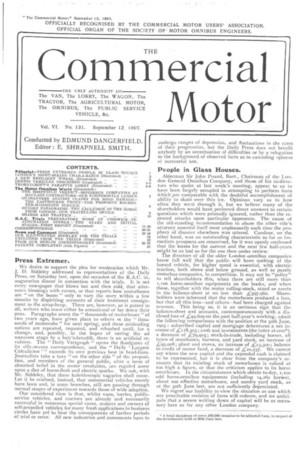Press Extremes.
Page 1

If you've noticed an error in this article please click here to report it so we can fix it.
We desire to support the plea for moderation which Mr. J. D. Siddeley addressed torepresentatives of the Daily Press, on Saturday last, upon the occasion of the R.A.C. inauguration dinner in connection with the trials. It is not every newspaper that blows hot and then cold, that alternates blessings with curses, or that reports how motorbuses are "on the boom" only to vary the story within a few Months by dispiriting accounts of their imminent consignment to the scrap-heap. There are, however, as is patent to all, writers who must either be sensational or lay down their pens. Paragraphs anent the" thousands of motorbuses "of two years ago, have given place to others re the " thousands of motorcabs " for next spring, and these misleading notices are repeated, requoted, and rehashed until, for a change, and, possibly, in the hopes of saving the ad nauseam stage by a hair's-breadth, there is an artificial revulsion. The " Daily Verigraph '7 opens the floodgates of its silly-season correspondence, and the " Daily ' Largest Calculation ' " exceeds its own previous best in head-lines. Journalists take a turn " on the other side " of the proposition, and members of the general public, after a term of absorbed belief in the motor revolution, are regaled anew upon a diet of horse-flesh and electric sparks. We ask, with Mr. Siddeley, that these kaleidoscopic vagaries shall cease. Let it be realised, instead, that commercial vehicles merely have been and, in some branches, still are passing through normal stages of experiment towards those of wide adoption.
Our considered view is that, whilst vans, lorries, publicservice vehicles, and tractors are already and necessarily successful in numerous special cases, makers and owners of self-propelled vehicles for many fresh applications in business circles have yet to bear the consequences of further periods of trial or error. All new industries and movements have to undergo ranges of depression, and fluctuations in the rates of their progression, but the Daily Press does not benefit anybody by an accentuation of difficulties or by a relegation to the background of observed facts as to extending spheres of successful use.
People in Glass Houses.
Alderman Sir John Pound, Bart., Chairman of the London General Omnibus Company, and those of hiS co-directors who spoke at last week's meeting, appear to us to have been largely occupied in attempting to perform feats Which are comparable with the doubtful accomplishment of ability to skate over thin ice. Opinions vary as to how often they went through it, but we believe many of the shareholders would have preferred direct answers to certain questions which were pointedly ignored, rather than the repeated attacks upon particular opponents. The cause of the old-standing recommendation to abuse the other side's attorney asserted itself most unpleasantly each time the prophecy of disaster elsewhere was uttered. Candour, on the other hand, was an outstanding characteristic so far as immediate prospects are concerned, for it was openly confessed that the losses for the ourrent and the next few half-years might be as bad as for the one then under review.
The directors of all the older London omnibus companies know full well that the public will have nothing of the horsed vehicle, for higher speed is essential, with electric traction, both above and below ground, as well as purely motorbus companies, in competition. It may not be "policy" to tell shareholders this, when there are still more than 1,100 horse-omnibus equipments on the books, and when these, together with the motor rolling-stock, stand as assets in the balance-sheet at no less than 597,96o. Shareholders were informed that the motorbuses produced a loss, but that all this loss—and others—had been charged against revenue. This being so, it is an ominous sign that the balance-sheet and accounts, contemporaneously with a disclosed loss of L:49,609 on the past half-year's working, admit the following comparisons with the position at the 3oth June, toos : subscribed capital and mortgage debentures a net increase of £118,303; cash and investments (the latter at cost*), a decrease of .79,9c15; stock-in-trade, including horses, all types of omnibuses, harness, and yard stock, an increase of L9s,9o8; plant and stores, an increase of .4'23,300; balance to credit of motor fund, a decrease of £2o,s37. We cannot say where the new capital and the expended cash is claimed to be represented, but it is clear from the company's accounts that its existing stock of motorbuses is valued at too high a figure, or that the criticism applies to its horse omnibuses. In the circumstances which obtain to-day, ',too odd horse-omnibus equipments (including 54,262 horses), about zoo effective motorbuses, and sundry yard stock, as at the 3oth June last, are not sufficiently depreciated.
We regret our inability to view the situation as one which any practicable revision of fares will redeem, and we anticipate that a severe writing down of capital will be as necessary here as for any other London company.




























